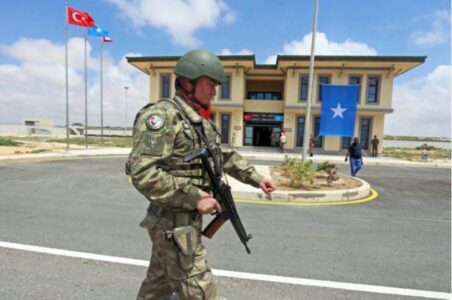
Al-Shabaab terrorists are expanding anti-Turkish campaign in Somalia
On January 18, al-Qaeda affiliated al-Shabaab conducted a suicide bombing outside of a Turkish military base in Somalia’s capital city of Mogadishu, killing at least four people and injuring around 14 others.
The group claimed responsibility for the attack through the official Shahada News Agency and touted the success of the operation against “Somali Special Forces who were trained by Turkish Forces.”
Al-Shabaab’s target selection, and the three separate mentions of Turkey in the statement, runs consistent with the group’s ongoing guerilla campaign against Turkish soldiers, nationals, and commercial interests in Somalia.
The group views Turkey as an influential supporter of the Somalian government and looks to drive the Turks out of Somalia with force.
Al-Shabaab has accordingly excoriated Turkish troops stationed in Somalia as foreign “invaders” and “occupiers”.
Over the past decade, Turkey has markedly expanded its political influence and security footprint in Somalia, as indicated by the 2017 establishment of its largest overseas military installation in Mogadishu.
Camp TURKSOM is a base and an academy intended to improve the Somali military’s operational capacities and counter-insurgency capabilities. This, in turn, has also made it a priority target for al-Shabaab plots and attacks.
Al-Shabaab’s anti-Turkey campaign began around July 2013 with a vehicle-borne improvised explosives device (VBIED) attack against the Turkish embassy in Mogadishu, which killed three people and injured several others.
Days after the bombing, Ahmed Abdi Godane, the group’s emir at the time, reportedly criticized Turkey for “trying to divide [al-Shabaab’s] leadership and its fighters.”
It further alleged that “countries like Qatar and Turkey as well former members of the defunct Union of the Islamic Courts (a movement that ruled most of Somalia’s southern and central regions in 2006) are key players in these divisive deeds”.
The anti-Turkish hostility continued to accelerate as Godane’s successor, Ahmed Diriye, took direct aim at Turkey in his first audio statement after stepping into al-Shabaab’s top leadership role.
In 2016, Diriye declared the Turkish government to be “the enemy of the nation” and accused Turkey of “looting Somali resources.” He asserted that “today Somalia’s economy is in total collapse because of their intervention. … Turkey has invaded this country economically. … They have taken control of the Somali economy and all they want is to keep the nation in poverty”
More recently, in a March 2021 video published by al-Shabaab’s official Al-Kataib Foundation for Media Productions, Diriye chastised the “apostate troops” of Turkey for supporting the “coalition of disbelievers who came from various countries” to wage “a war against the Muslims of Somalia”.
For the past decade, al-Shabaab has been pursuing a campaign of violence aimed at Turkish politicians, diplomats, soldiers, and workers in Somalia. Notably, in 2015, the group conducted a suicide car bombing outside of the SYL Hotel in Mogadishu.
At the time, Turkish delegates were meeting in preparation for President Recep Tayyip Erdogan’s visit, which was scheduled for the next day.
Al-Shabaab’s militant operations against Turkish nationals and interests had been conducted entirely on land until February 2, 2016, when the group dispatched a suicide bomber and attempted to take down a passenger plane. The original target was a Turkish Airlines flight, but its departure was canceled due to poor weather conditions.
The suicide bomber, along with the other stranded passengers, then boarded a Somali-operated Daallo Airlines flight. Once in the air, the al-Shabaab operative detonated the explosive device (believed to be concealed in a laptop) and blew a hole in the fuselage.
Of the 81 occupants onboard, only the bomber was killed while two other passengers were injured. Fortunately for the passengers, the aircraft remained functional and was able to successfully return to Aden Adde International Airport to perform an emergency landing.
Al-Shabaab claimed responsibility for the bombing, telling al-Jazeera that the intended targets were Turkish NATO forces and Western officials.
Over the next few years, al-Shabaab continued its anti-Turkey campaign through propaganda messaging and militant operations. In December 2019, the group struck a convoy with a car bomb, killing two Turkish nationals.
In the aftermath of the attack, al-Shabaab’s spokesman, Ali Dhere, stated the group “will continue attacking Turks who invaded our country” and accused Turkey of conspiring to take control of Somalia’s resources.
In terms of security assets, the Turkish military base in Mogadishu was targeted with rockets in May 2018 and with suicide bombings in June 2020 and January 2022.
The group has also targeted Turkish commercial interests, as seen with the January 2, 2021, suicide attack on employees of a Turkish company working on the road from Mogadishu to Afgoye. The blast ultimately killed two Turkish nationals.
More recently, al-Shabaab took responsibility for a roadside bomb attack that injured four Turkish businessmen in Mogadishu on March 17, 2022, stating they intentionally singled out the foreign nationals.
In addition to the attempted bombing of an airliner heading to Djibouti, there are further indications that Turkey potentially faces a transnational threat from al-Shabaab.
In February 2021, for instance, Turkish police, in coordination with Somalia’s National Intelligence Organization (MIT), arrested an alleged al-Shabaab militant in Turkey’s capital city of Ankara.
The suspect was a German-Italian national accused of having connections to al-Shabaab operatives in Kenya.
Source: James Town





